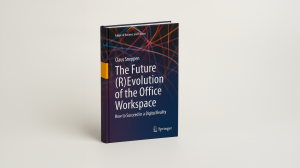
New Book on the future of the workplace
In his newly published book, The (R)Evolution of the Office Workspace, Claus Sneppen examines the future of the workplace.
COPENHAGEN, DENMARK, May 1, 2025 /EINPresswire.com/ -- For many leaders, the post-pandemic ideal remains a “return to a new normal” - a revival of the office as we knew it, just adding flexibility. But this vision will prove unrealistic. The office is no longer a static entity, and today’s office workplace is caught between two opposing forces: long-term investments in systems, structures, and spaces designed for stability, and the relentless pace of digital transformation reshaping how knowledge work is actually done.In his newly published book, The (R)Evolution of the Office Workspace (Springer Nature, Future of Business and Finance Series), Claus Sneppen, Associated Partner at the Copenhagen Institute for Futures Studies, examines this deep and accelerating disruption. He argues that while office infrastructures—whether physical layouts, IT systems, or governance structures—are inherently long-term and near-static, the digital worklife they’re supposed to support is fast-moving, dynamic, and constantly evolving.
This creates a growing mismatch between how offices are built and how work actually happens.
The pandemic didn’t cause this tension - it exposed and accelerated it. Hybrid and remote work models are no longer temporary fixes but enduring components of the modern office workplace. As a result, organisations must now manage a complex balancing act: digital vs. physical, autonomy vs. collaboration, employee expectations vs. leadership control.
Despite early predictions of a return to pre-pandemic norms, remote work remains deeply embedded. Middel-managers are under pressure to bridge the gap between top-down expectations and the lived realities of their teams. Economic uncertainty adds further pressure, challenging organisations to decide whether to double down on traditional office models or embrace flexibility as a strategic asset.
“The future of the office is not about what leaders wish for - it’s about objective evaluation and adaptation,” says Sneppen. “Success in the hybrid era demands more than incremental change. It requires a rethinking of how we design office workspaces, lead teams, and structure organisations.”
Organisations that will thrive are those that embrace change - not reactively, but strategically. This means developing hybrid models grounded in agility, data, and foresight. It means letting go of outdated assumptions and acknowledging that today’s workforce values flexibility, autonomy, and meaning over presence and predictability.
Ultimately, a sustainable hybrid and flexible office model must be seen as a continuous process - not a one-time solution. The real question isn’t whether the office will change. It’s how quickly leaders can evolve with it.
For media inquiries, interviews, or review copies, please contact:
Claus Sneppen
📞 +45 26211221
📧 csn@cifs.dk
Claus Sneppen
Copenhagen Institute for Futures Studies
+45 26 21 12 21
email us here
Distribution channels: Business & Economy, Culture, Society & Lifestyle
Legal Disclaimer:
EIN Presswire provides this news content "as is" without warranty of any kind. We do not accept any responsibility or liability for the accuracy, content, images, videos, licenses, completeness, legality, or reliability of the information contained in this article. If you have any complaints or copyright issues related to this article, kindly contact the author above.
Submit your press release

